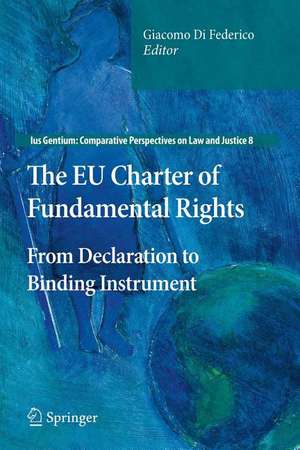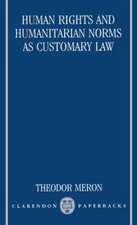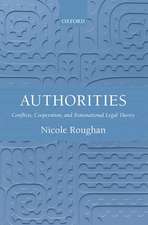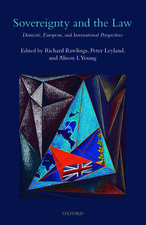The EU Charter of Fundamental Rights: From Declaration to Binding Instrument: Ius Gentium: Comparative Perspectives on Law and Justice, cartea 8
Editat de Giacomo Di Federicoen Limba Engleză Paperback – 27 ian 2013
| Toate formatele și edițiile | Preț | Express |
|---|---|---|
| Paperback (1) | 946.72 lei 6-8 săpt. | |
| SPRINGER NETHERLANDS – 27 ian 2013 | 946.72 lei 6-8 săpt. | |
| Hardback (1) | 952.72 lei 6-8 săpt. | |
| SPRINGER NETHERLANDS – 9 dec 2010 | 952.72 lei 6-8 săpt. |
Din seria Ius Gentium: Comparative Perspectives on Law and Justice
- 20%
 Preț: 1128.14 lei
Preț: 1128.14 lei - 20%
 Preț: 1565.15 lei
Preț: 1565.15 lei - 18%
 Preț: 1115.28 lei
Preț: 1115.28 lei - 18%
 Preț: 904.28 lei
Preț: 904.28 lei - 18%
 Preț: 1001.81 lei
Preț: 1001.81 lei -
 Preț: 550.46 lei
Preț: 550.46 lei -
 Preț: 180.18 lei
Preț: 180.18 lei - 24%
 Preț: 787.30 lei
Preț: 787.30 lei - 18%
 Preț: 1115.28 lei
Preț: 1115.28 lei - 15%
 Preț: 635.31 lei
Preț: 635.31 lei - 18%
 Preț: 1108.67 lei
Preț: 1108.67 lei - 18%
 Preț: 1007.97 lei
Preț: 1007.97 lei - 18%
 Preț: 784.79 lei
Preț: 784.79 lei - 18%
 Preț: 1223.11 lei
Preț: 1223.11 lei - 18%
 Preț: 891.02 lei
Preț: 891.02 lei - 18%
 Preț: 1009.40 lei
Preț: 1009.40 lei - 18%
 Preț: 1005.74 lei
Preț: 1005.74 lei - 18%
 Preț: 1014.89 lei
Preț: 1014.89 lei - 18%
 Preț: 896.70 lei
Preț: 896.70 lei - 15%
 Preț: 641.85 lei
Preț: 641.85 lei - 18%
 Preț: 779.71 lei
Preț: 779.71 lei - 18%
 Preț: 1010.79 lei
Preț: 1010.79 lei - 18%
 Preț: 1010.03 lei
Preț: 1010.03 lei - 18%
 Preț: 950.52 lei
Preț: 950.52 lei - 15%
 Preț: 638.76 lei
Preț: 638.76 lei - 18%
 Preț: 947.50 lei
Preț: 947.50 lei - 20%
 Preț: 564.76 lei
Preț: 564.76 lei - 18%
 Preț: 1115.14 lei
Preț: 1115.14 lei - 18%
 Preț: 944.82 lei
Preț: 944.82 lei - 15%
 Preț: 635.80 lei
Preț: 635.80 lei - 15%
 Preț: 637.59 lei
Preț: 637.59 lei - 15%
 Preț: 643.65 lei
Preț: 643.65 lei
Preț: 946.72 lei
Preț vechi: 1154.54 lei
-18% Nou
Puncte Express: 1420
Preț estimativ în valută:
181.17€ • 189.38$ • 153.10£
181.17€ • 189.38$ • 153.10£
Carte tipărită la comandă
Livrare economică 07-21 martie
Preluare comenzi: 021 569.72.76
Specificații
ISBN-13: 9789400734555
ISBN-10: 9400734557
Pagini: 340
Ilustrații: XX, 320 p.
Dimensiuni: 155 x 235 x 18 mm
Greutate: 0.48 kg
Ediția:2011
Editura: SPRINGER NETHERLANDS
Colecția Springer
Seria Ius Gentium: Comparative Perspectives on Law and Justice
Locul publicării:Dordrecht, Netherlands
ISBN-10: 9400734557
Pagini: 340
Ilustrații: XX, 320 p.
Dimensiuni: 155 x 235 x 18 mm
Greutate: 0.48 kg
Ediția:2011
Editura: SPRINGER NETHERLANDS
Colecția Springer
Seria Ius Gentium: Comparative Perspectives on Law and Justice
Locul publicării:Dordrecht, Netherlands
Public țintă
ResearchCuprins
Abbreviations.- Acknowledgements.- Preface; Giacomo Di Federico.- Part I The Charter of Fundamental Rights in a broader perspective.- Chapter I The Charter of Fundamental Rights and the European Res Publica; Ola Zetterquist.- Chapter II Fundamental rights in the EU: Legal pluralism and multi-level protection after the Lisbon Treaty; Giacomo Di Federico.- Chapter III The European Charter of Fundamental Rights and the courts; Valentina Bazzocchi.- Chapter IV The European Parliament and the EU Charter of Fundamental Rights; Federico Camporesi.- Chapter V Fair trial, due process and the rights of defence in the EU legal order; Marco Borraccetti.- Chapter VI EU Member States and candidate countries facing a binding Charter of Fundamental Rights: What’s new?; Luisa Ficchi.- Part II The Charter of Fundamental Rights Applied.- Chapter VII Free movement of “needy” citizens after the binding Charter. Solidarity for all?; Federico Forni.- Chapter VIII Internal market derogations in the light of the newly binding character of the EU Charter of Fundamental Rights; Stephen James Curzon.- Chapter IX Article 47 of the EU Charter of Fundamental Rights and its impact on judicial cooperation in civil and commercial matters; Giangiuseppe Sanna.- Chapter X The Charter and the Area of Freedom, Security and Justice; Valentina Bazzocchi.- Chapter XI Social Rights in the European Union: the contribution of a binding EU Charter of Fundamental Rights; Serena Coppola.- Chapter XII The Charter of Fundamental Rights and the environment policy integration principle; Marco Lombardo.- Chapter XIII The EU Charter of Fundamental Rights and the social dimension of international trade; Valeria Bonavita.- Chapter XIV The European Charter of Fundamental Rights after Lisbon: a ‘timid’ Trojan horse in the domain of the common foreign and security policy?; Luca Paladini.- Bibliography.- Table of Cases.- Index.
Recenzii
From the reviews:
“The book edited by Giacomo di Federico … takes on a more specific approach and exclusively deals with the innovations brought about by the Charter of Fundamental Rights of the European Union. … In a nutshell, this book offers an excellent first assessment of the present status of the Charter and of possible future developments in a crucial domain of EU law, both in terms of legislative action and judicial practice.” (Paul Gragl, European Yearbook of Human Rights, 2011)
“The book edited by Giacomo di Federico … takes on a more specific approach and exclusively deals with the innovations brought about by the Charter of Fundamental Rights of the European Union. … In a nutshell, this book offers an excellent first assessment of the present status of the Charter and of possible future developments in a crucial domain of EU law, both in terms of legislative action and judicial practice.” (Paul Gragl, European Yearbook of Human Rights, 2011)
Textul de pe ultima copertă
The first part of this book reviews the multi-level system of protection currently operating in Europe and its constitutional implications. The book presents an analysis of the Charter from a legal, political and practical standpoint. It further examines the activity of the European Parliament as a fundamental rights actor, as well as the right to a fair trial and to effective judicial protection before and by the EU Courts. The second part of the volume addresses the impact of a binding Charter on specific areas of EU Law. The order of the contributions in this volume reflects the structure of the Treaty on the functioning of the European Union: free circulation of persons; the internal market; the area of freedom security and justice (civil and criminal aspects); social rights protection; environmental policy; enlargement; international trade and the Common Foreign and Security Policy.
Caracteristici
First major examination of the impact of a binding Charter of Fundamental rights First book to consider future accession to the ECHR Permits a comprehensive understanding of the EU’s commitment towards fundamental rights















